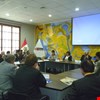


GWP Executive Secretary Dr. Ania Grobicki moderated a debate on water and sanitation at the UN General Assembly in New York on 18 February 2014. After the debate was over, Dr. Grobicki said that a global water goal is far from being a done deal.
The Chair of the GWP Technical Committee, Dr. Mohamed Ait-Kadi is happy to announce the arrival of three new members on the committee, appointed by the Steering Committee: Mike Young, Nicole Bernex and Dan Tarlock. In addition, Dr Thomas Panella has been appointed as the Asian Development Bank representative.

The Regional Secretariat of GWP Eastern Africa assisted with technical and financial support to a meeting in Mogadishu to launch a Somalia Country Water Partnership on 29th January 2014. As a result of the meeting, Somalia is soon set to join GWP by establishing a Country Water Partnership.

Global Water Partnership (GWP) and the United Nations Children's Fund, UNICEF, have agreed to establish a strategic partnership to jointly undertake work on climate resilience and WASH. The initial collaboration is for six months, with a potential continuation.

An e-module on IWRM was launched in 2012 after a lengthy a collaboration between several German institutions that had identified a gap in the field of integrated water resources management education. The development of the module continues, with GWP as a potential “catalyst” to generate further interest in the module.

GWP participated in a meeting of the Inter-American Network of Academies of Sciences (IANAS) in Lima 2-4 December 2013. The topic was urban water management, and the meeting enabled advances in the elaboration of the IANAS book “Urban water in the Americas”, to be launched later this year.

GWP China addressed issues connected to climate change, flood control and use of rainwater in a workshop held in Baoding, in the Hebei Province, on 26-27 November 2013.

In 2013 UN-Water initiated an expert consultation process where UN-Water’s 31 UN-members and 36 international Partners, including GWP, came together to analyze what role water could have in the Post-2015 Development Agenda. The result is a joint paper with technical advice.

The GWP Water, Climate and Development Programme (WACDEP) guided and inspired a National Dialogue between the Burundi Ministry of Water, Environment, Land Management and Urbanism (MEATU) and citizens over the sustainable management of the Cohoha Water Catchment in December 2013.
Dr. Beatrice Mosello, from the Overseas Development Institute, shares her experience of the recent Water, Climate Development Programme training workshop in Addis Ababa, and her optimism for the integration of water security and climate resilience into development planning in Africa.